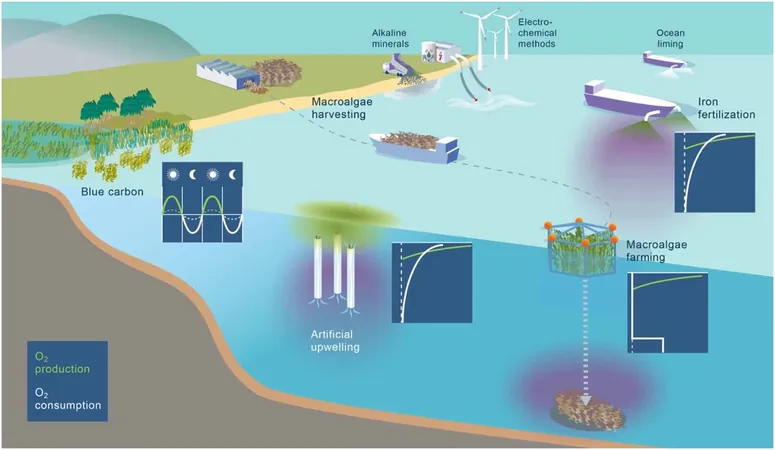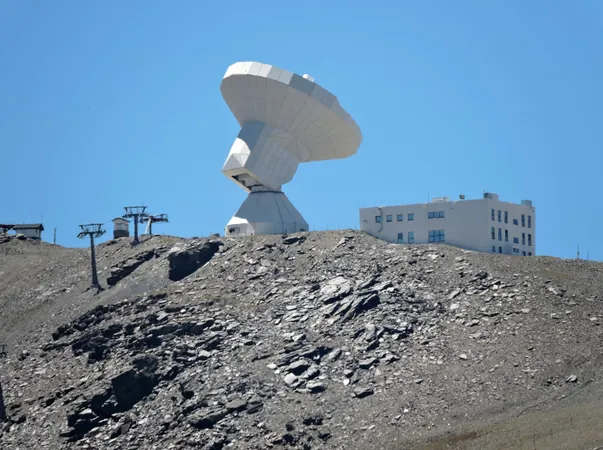
Warning: Carbon Dioxide Removal Methods Could Threaten Ocean Oxygen Levels!
2025-06-14
Author: Benjamin
Revolutionary Solutions Could Backfire!
As the world grapples with the escalating climate crisis, innovative methods to boost the ocean's ability to absorb carbon dioxide (CO₂) are under investigation. Yet, a new study signals that these very strategies could inadvertently worsen ocean deoxygenation, raising urgent questions about their viability.
Groundbreaking Research Unveils Troubling Findings
Led by the esteemed Prof. Dr. Andreas Oschlies from the GEOMAR Helmholtz Center for Ocean Research Kiel, an international team of researchers conducted an extensive analysis published in 'Environmental Research Letters.' Their findings highlight a significant concern: that many proposed marine carbon dioxide removal (mCDR) methods might exacerbate the decline of oxygen levels in our oceans.
The Oxygen Crisis: A Dire Reality
Global warming has already led to a worrying 2% reduction in ocean oxygen levels over the past few decades, with serious ecological ramifications. While one might assume that climate mitigation strategies would help reverse this trend, the study reveals a stark reality. Certain biological mCDR methods could magnify oxygen depletion instead.
Protecting the Ocean: A Complex Challenge
Prof. Dr. Oschlies warns, "What benefits the climate may not necessarily safeguard the ocean." Collaborating with the UNESCO Global Ocean Oxygen Network, the team analyzed both direct and climate-related impacts of various mCDR approaches using sophisticated global modeling.
Critical Methods Under Scrutiny
The research identifies particularly concerning techniques like ocean fertilization, large-scale macroalgae farming followed by biomass sinking, and artificial upwelling as highly detrimental. These methods boost photosynthesis but lead to oxygen-depleting decomposition, paralleling the current oxygen loss triggered by warming.
Potential Gains vs. Detrimental Effects
The study warns that these approaches could create oxygen deficits that are 4 to 40 times greater than the gains achieved from reduced global warming. In contrast, simpler geochemical methods that enhance ocean alkalinity without nutrient input show minimal impact on oxygen levels, aligning more closely with traditional CO₂ reduction efforts.
A Beacon of Hope: Macroalgae Farming
Interestingly, the research found that large-scale macroalgae farming with biomass removal could actually enhance ocean oxygen levels, providing as much as ten times the oxygen lost over the last century, albeit at the risk of disrupting biological productivity.
Urgent Call for Monitoring Ocean Health
In light of these alarming insights, the authors stress the necessity of including oxygen measurements in all future marine carbon dioxide removal research and deployment activities.
The Ocean's Role in Climate Strategy
Even with ambitious climate plans, projections show that Germany will still emit 10% to 20% of its current greenhouse gas levels in thirty years. As a result, carbon dioxide removal methods are being considered crucial for achieving net-zero emissions.
Understanding the complex interplay between carbon removal and ocean health is vital, as the ocean remains integral to the global carbon cycle, with its vast capacity for CO₂ absorption. The stakes have never been higher for safeguarding our blue planet!









 Brasil (PT)
Brasil (PT)
 Canada (EN)
Canada (EN)
 Chile (ES)
Chile (ES)
 Česko (CS)
Česko (CS)
 대한민국 (KO)
대한민국 (KO)
 España (ES)
España (ES)
 France (FR)
France (FR)
 Hong Kong (EN)
Hong Kong (EN)
 Italia (IT)
Italia (IT)
 日本 (JA)
日本 (JA)
 Magyarország (HU)
Magyarország (HU)
 Norge (NO)
Norge (NO)
 Polska (PL)
Polska (PL)
 Schweiz (DE)
Schweiz (DE)
 Singapore (EN)
Singapore (EN)
 Sverige (SV)
Sverige (SV)
 Suomi (FI)
Suomi (FI)
 Türkiye (TR)
Türkiye (TR)
 الإمارات العربية المتحدة (AR)
الإمارات العربية المتحدة (AR)